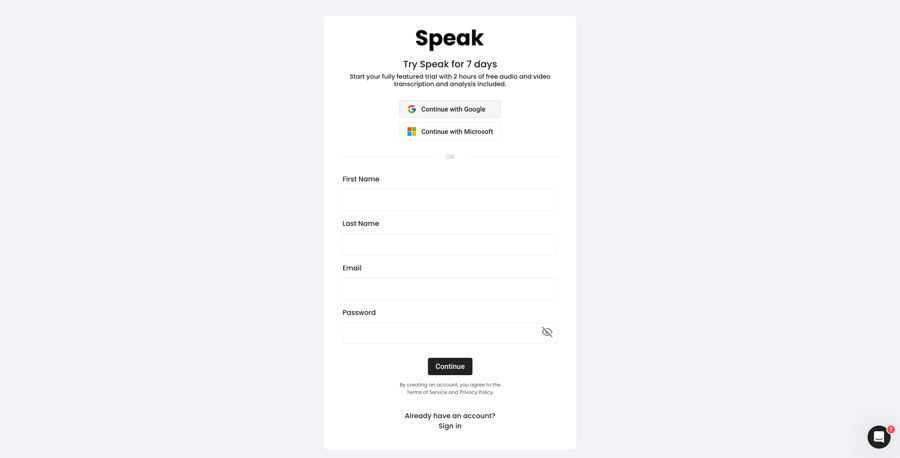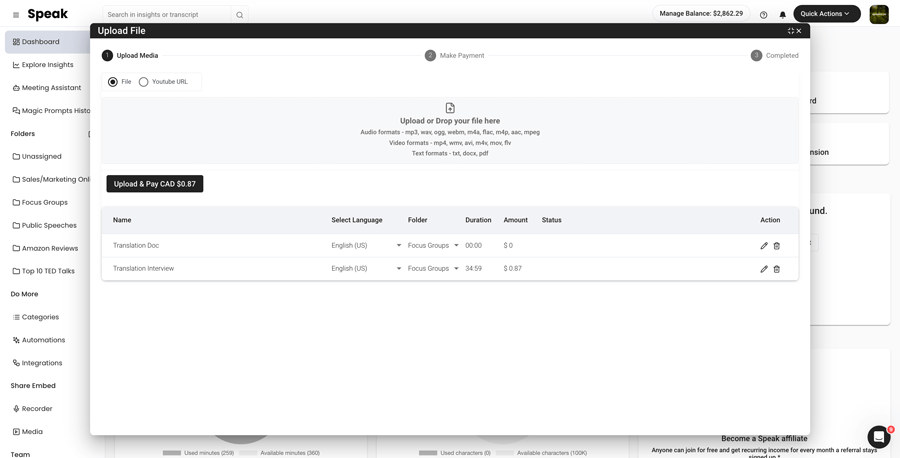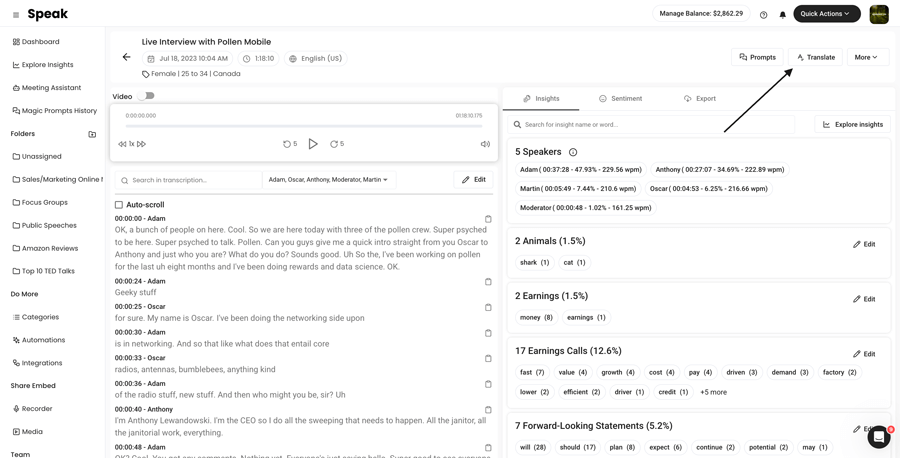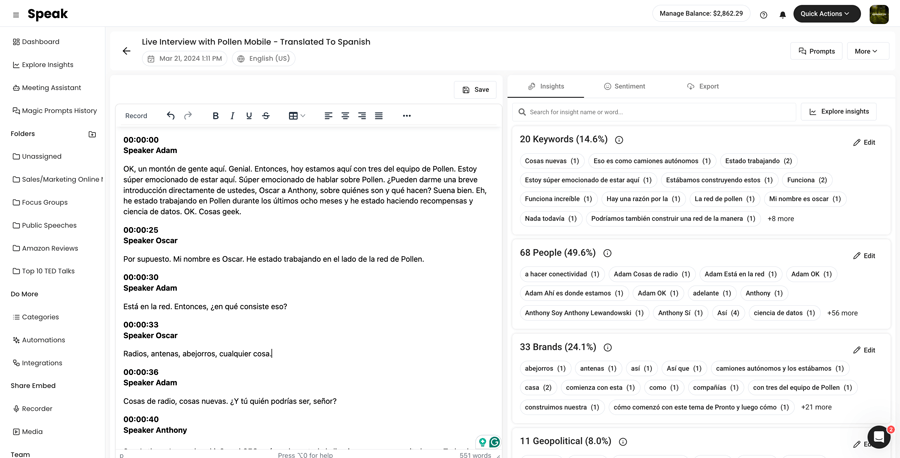How To Translate German to Esperanto
Translating German to Esperanto is super simple!

Step 1: Register for Speak
Register for Speak using this link.
Once you register, you can instantly begin translating your German to Esperanto file(s).

Step 2: Upload Your German file(s)
As soon as you log in, you will be redirected to the dashboard.
Once there, you can select the Quick Action "New Upload".
In Speak, you can seamlessly upload, transcribe and translate audio, video and text files all at once!

Step 3: Translate Your German file(s) to Esperanto
Once the file is uploaded, simply visit your file and select "Translate".
If it is an audio and video file, Speak will ask you if you want to keep the speaker names and timestamps in the translation.
Want to translate many files at once? No problem!
You can view the files you want to automatically translate from German to Esperanto from the folder level and instantly translate as many files as you need with our artificial intelligence translation in just a few clicks.

Step 4: That's It! View, Analyze, Modify & Export Your New Esperanto file(s)
Once the translation is done, you will be alerted and you will see a new document in the same folder your original file is in.
The file will be named the same but with a dash indicating that it is the translated version.
Need support with your German translation?
We are always here and happy to help at Speak!
Just send us a message on live chat on the bottom right corner and we will ensure you are set up for success.
Interested in translating German or other languages to different languages? View our entire list of supported translation languages here.
Automatic, accurate, instant AI translation from German to Esperanto is here for you.
Register for Speak using this link and begin translating German to Esperanto today.
Unlocking Global Communication: The Benefits of Translating German to Esperanto
With globalization shrinking distances and digital transformations accelerating connections, the need for effective communication across languages has never been more critical. In the realm of linguistic diversity, translating German to Esperanto represents an intriguing intersection of cultural heritage and international lingua franca. As a leading NLP and transcription software company, Speak Ai is at the forefront of harnessing the power of AI translation, bringing down language barriers and fostering understanding across borders.
The Strategic Advantage of German to Esperanto Translation
German, spoken by millions worldwide, holds significant influence in European commerce, science, and literature. On the other hand, Esperanto, an artificially created language designed for universal communication, boasts a dedicated global community. Leveraging AI translation to bridge these linguistic domains not only nurtures scholarly and business collaborations but also enriches cultural exchanges.
Empowering Researchers and Businesses
For researchers delving into Germanic studies or businesses expanding into European markets, translating documents, audio, and video from German to Esperanto can unlock previously inaccessible knowledge and audiences. Speak Ai's cutting-edge technology ensures high accuracy, context-aware translations, enabling seamless integration into existing workflows.
Cost and Time Efficiencies
Automatic translation dramatically reduces the time and expenses associated with traditional translation services. By utilizing Speak Ai's solutions, users can expect swift, reliable translations, enhancing productivity and accelerating project timelines.
Revolutionizing Communication with Speak Ai
At Speak Ai, we're proud of our AI Meeting Assistant that seamlessly integrates with Microsoft Teams, Zoom, Google Meet, and Webex calls, offering live translations and transcriptions. This capability is particularly valuable in multilingual meetings, ensuring inclusivity and comprehension for all participants.
Our platform is designed to support vast applications, from translating educational material and literary works to enabling international collaborations with ease. With our AI-powered tools, automatic analysis, and Generative AI capabilities, we're set on breaking linguistic barriers, rated highly with a 4.9 on G2 and embraced by over 150,000 users globally.
Exploring the Linguistic Landscape
German and Esperanto: Popular Locations and Stats
German is predominantly spoken in Germany, Austria, and parts of Switzerland, with an estimate of over 130 million speakers worldwide. It's a key language in academic research and international trade within Europe. Esperanto, designed to be an easy-to-learn second language, has amassed a global community of speakers, estimated between 100,000 to 2 million. Its popularity spans countries with active Esperanto associations and clubs, making it a truly global language.
Interesting Facts and Figures
German is one of the world's major languages, known for its complex grammar and vocabulary. It has the largest number of native speakers in the European Union. Esperanto, created in the late 19th century by L.L. Zamenhof, aimed to promote world peace and mutual understanding through a universal second language.
German and Esperanto: A Comparative Look
Differences That Define
While German is a natural language with a rich historical evolution, Esperanto was meticulously designed with ease of learning in mind, free from irregularities and exceptions common in most languages. German's grammatical structure is infamously intricate, with three genders and numerous cases for nouns. Esperanto, by contrast, aims for simplicity, with a consistent grammatical framework and no grammatical gender.
Uniting Similarities
Despite their differences, both languages share a commitment to facilitating communication. German has contributed significantly to science, philosophy, and literature, while Esperanto has been a symbol of internationalism and cultural exchange. Interestingly, Esperanto draws heavily from Indo-European languages, including German, making German to Esperanto translation a unique blend of linguistic fidelity and innovation.
Conclusion: The Future of Language is Inclusive and Automated
Translating German to Esperanto unlocks new possibilities for global dialogue and cooperation. With Speak Ai's advanced AI translation technologies, researchers and businesses can navigate the complexities of language with unparalleled ease and efficiency. Embrace the future of communication where languages no longer divide but unite us in our shared quest for knowledge and progress.
Ready to transcend language barriers?
Discover the potential of automatic translation and join the community of forward-thinkers who are leveraging Speak Ai to connect worlds. Experience the power of AI in breaking down linguistic barriers and expanding your global reach.
Translate German to Esperanto effortlessly with Speak Ai, and embark on a journey of endless possibilities and international connections. Sign up today to revolutionize your communication strategies and bridge the linguistic divide with confidence and ease.
FAQs
For further information on how Speak Ai can transform your translation needs, visit our FAQ section or contact us directly. Our team is dedicated to providing you with the best solutions for your language translation challenges.
Translate German To These Other Supported Languages:
- Translate German-to-Afrikaans
- Translate German-to-Albanian
- Translate German-to-Amharic
- Translate German-to-Arabic (Egypt)
- Translate German-to-Arabic (Iraq)
- Translate German-to-Arabic (Israel)
- Translate German-to-Arabic (Jordan)
- Translate German-to-Arabic (Kuwait)
- Translate German-to-Arabic (Lebanon)
- Translate German-to-Arabic (Oman)
- Translate German-to-Arabic (Palestinian Authority)
- Translate German-to-Arabic (Qatar)
- Translate German-to-Arabic (Saudi Arabia)
- Translate German-to-Arabic (Syrian Arab Republic)
- Translate German-to-Arabic (United Arab Emirates)
- Translate German-to-Arabic Modern Standard (Bahrain)
- Translate German-to-Armenian
- Translate German-to-Assamese
- Translate German-to-Aymara
- Translate German-to-Azerbaijani
- Translate German-to-Bambara
- Translate German-to-Basque
- Translate German-to-Belarusian
- Translate German-to-Bengali
- Translate German-to-Bhojpuri
- Translate German-to-Bosnian
- Translate German-to-Bulgarian
- Translate German-to-Catalan
- Translate German-to-Cebuano
- Translate German-to-Chinese (Simplified)
- Translate German-to-Chinese (Traditional)
- Translate German-to-Corsican
- Translate German-to-Croatian
- Translate German-to-Czech
- Translate German-to-Danish
- Translate German-to-Dari
- Translate German-to-Dhivehi
- Translate German-to-Dogri
- Translate German-to-Dutch
- Translate German-to-English
- Translate German-to-English (Australia)
- Translate German-to-English (Indian)
- Translate German-to-English (Irish)
- Translate German-to-English (New Zealand)
- Translate German-to-English (Scottish)
- Translate German-to-English (South African)
- Translate German-to-English (United Kingdom)
- Translate German-to-English (United States)
- Translate German-to-Esperanto
- Translate German-to-Estonian
- Translate German-to-Ewe
- Translate German-to-Farsi (Persian)
- Translate German-to-Filipino Tagalog
- Translate German-to-Finnish
- Translate German-to-French
- Translate German-to-French (Canada)
- Translate German-to-Frisian
- Translate German-to-Galician
- Translate German-to-Georgian
- Translate German-to-German
- Translate German-to-German (Swiss)
- Translate German-to-Greek
- Translate German-to-Guarani
- Translate German-to-Gujarati
- Translate German-to-Haitian Creole
- Translate German-to-Hausa
- Translate German-to-Hawaiian
- Translate German-to-Hebrew
- Translate German-to-Hindi
- Translate German-to-Hmong
- Translate German-to-Hungarian
- Translate German-to-Icelandic
- Translate German-to-Igbo
- Translate German-to-Ilocano
- Translate German-to-Indonesian
- Translate German-to-Irish
- Translate German-to-Italian
- Translate German-to-Japanese
- Translate German-to-Javanese
- Translate German-to-Kannada
- Translate German-to-Kazakh
- Translate German-to-Khmer
- Translate German-to-Kinyarwanda
- Translate German-to-Konkani
- Translate German-to-Korean
- Translate German-to-Krio
- Translate German-to-Kurdish
- Translate German-to-Kurdish (Sorani)
- Translate German-to-Kyrgyz
- Translate German-to-Lao
- Translate German-to-Latin
- Translate German-to-Latvian
- Translate German-to-Lingala
- Translate German-to-Lithuanian
- Translate German-to-Luganda
- Translate German-to-Luxembourgish
- Translate German-to-Macedonian
- Translate German-to-Maithili
- Translate German-to-Malagasy
- Translate German-to-Malay
- Translate German-to-Malayalam
- Translate German-to-Maltese
- Translate German-to-Maori
- Translate German-to-Marathi
- Translate German-to-Meiteilon (Manipuri)
- Translate German-to-Mizo
- Translate German-to-Mongolian
- Translate German-to-Myanmar (Burmese)
- Translate German-to-Nepali
- Translate German-to-Norwegian
- Translate German-to-Nyanja (Chichewa)
- Translate German-to-Odia (Oriya)
- Translate German-to-Oromo
- Translate German-to-Pashto
- Translate German-to-Persian
- Translate German-to-Polish
- Translate German-to-Portuguese
- Translate German-to-Portuguese (Brazilian)
- Translate German-to-Portuguese (Portugal)
- Translate German-to-Punjabi
- Translate German-to-Quechua
- Translate German-to-Romanian
- Translate German-to-Russian
- Translate German-to-Samoan
- Translate German-to-Sanskrit
- Translate German-to-Scots Gaelic
- Translate German-to-Sepedi
- Translate German-to-Serbian
- Translate German-to-Sesotho
- Translate German-to-Shona
- Translate German-to-Sindhi
- Translate German-to-Sinhala
- Translate German-to-Sinhala (Sinhalese)
- Translate German-to-Slovak
- Translate German-to-Slovenian
- Translate German-to-Somali
- Translate German-to-Spanish
- Translate German-to-Spanish (Mexico)
- Translate German-to-Sundanese
- Translate German-to-Swahili
- Translate German-to-Swedish
- Translate German-to-Tajik
- Translate German-to-Tamil
- Translate German-to-Tatar
- Translate German-to-Telugu
- Translate German-to-Thai
- Translate German-to-Tigrinya
- Translate German-to-Tsonga
- Translate German-to-Turkish
- Translate German-to-Turkmen
- Translate German-to-Twi (Akan)
- Translate German-to-Ukrainian
- Translate German-to-Urdu
- Translate German-to-Uyghur
- Translate German-to-Uzbek
- Translate German-to-Vietnamese
- Translate German-to-Welsh
- Translate German-to-Xhosa
- Translate German-to-Yiddish
- Translate German-to-Yoruba
- Translate German-to-Zulu



